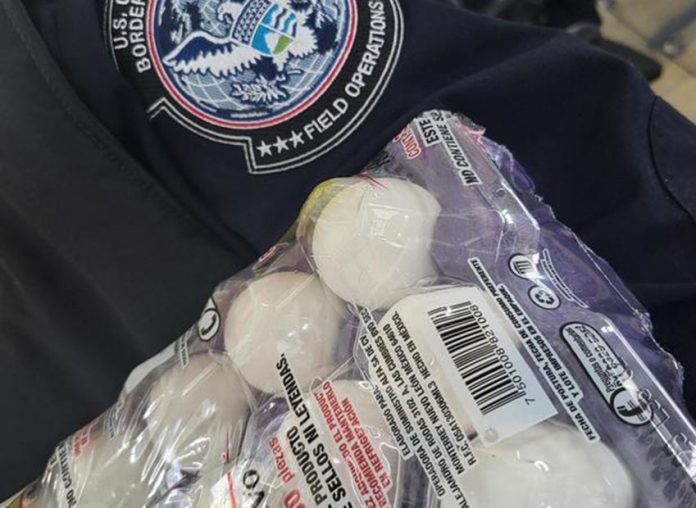Illicit drugs, migrants and … eggs.
It’s well-known that criminals smuggle narcotics and people across Mexico’s northern border into the United States. Now, people are also trying to move bacon’s frequent companion into the U.S. due to high egg prices in that country.
Jennifer de la O, a U.S. Customs and Border Protection (CBP) director of field operations, said on Twitter last Wednesday that “the San Diego Field Office has recently noticed an increase in the number of eggs intercepted at our ports of entry.”
“As a reminder, uncooked eggs are prohibited entry from Mexico into the U.S.,” she added. “Failure to declare agriculture items can result in penalties of up to $10,000.”
A short video in the same post said that “uncooked eggs are not allowed to be crossed into the U.S. from Mexico due to risk of bird flu and Newcastle disease.”
The San Diego Field Office has recently noticed an increase in the number of eggs intercepted at our ports of entry. As a reminder, uncooked eggs are prohibited entry from Mexico into the U.S. Failure to declare agriculture items can result in penalties of up to $10,000. pic.twitter.com/ukMUvyKDmL
— Director of Field Operations Jennifer De La O (@DFOSanDiegoCA) January 18, 2023
In an email sent to CNN, CBP public affairs specialist Gerrelaine Alcordo attributed the increase in attempts to smuggle Mexican eggs across the border to the rising cost of the product in the United States.
According to the U.S. Bureau of Labor Statistics, eggs were 59.9% more expensive in December than a year earlier and 11.1% more costly than in November. Widespread outbreaks of avian influenza on U.S. chicken farms as well as inflation and supply chain problems have caused the price of eggs to surge.
Alcordo told CNN that increases in attempts to smuggle eggs into the U.S. from Mexico have been seen at crossings between Tijuana and San Diego as well as “other southwest border locations.”
If border-crossers declare they are carrying uncooked eggs, they can “abandon the product without consequence,” the official said.
““CBP agriculture specialists will collect and then destroy the eggs as is the routine course of action,” Alcordo said.
She said that some travelers who didn’t declare the eggs they were carrying were fined US $300.

“Penalties can be higher for repeat offenders or commercial-size imports,” she said.
It was unclear whether anyone had attempted to smuggle large quantities of Mexican eggs into the United States, where a dozen eggs can cost as much as $7.37, according to a report by National Public Radio.
In contrast, a carton of 30 eggs sells for $3.40 in Ciudad Juárez, according to the news website Border Report.
Alcordo told NPR that shoppers from El Paso – located opposite Ciudad Juárez – are purchasing eggs across the border due to the lower prices. Most of those people don’t realize that taking Mexican eggs into the U.S. is prohibited, she said.
The importation of Mexican eggs to the United States has been prohibited by the U.S. Department of Agriculture since 2012 “based on the diagnosis of highly pathogenic avian influenza in commercial poultry.”
